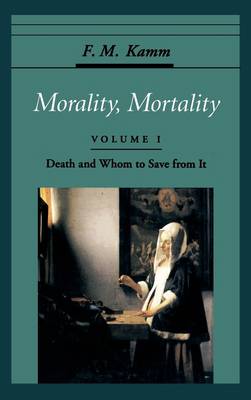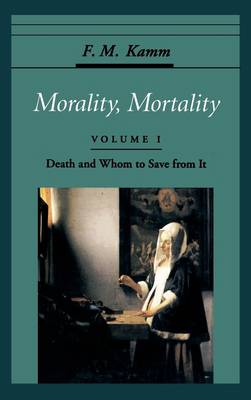
Door een staking bij bpost kan je online bestelling op dit moment iets langer onderweg zijn dan voorzien. Dringend iets nodig? Onze winkels ontvangen jou met open armen!
- Afhalen na 1 uur in een winkel met voorraad
- Gratis thuislevering in België vanaf € 30
- Ruim aanbod met 7 miljoen producten
Door een staking bij bpost kan je online bestelling op dit moment iets langer onderweg zijn dan voorzien. Dringend iets nodig? Onze winkels ontvangen jou met open armen!
- Afhalen na 1 uur in een winkel met voorraad
- Gratis thuislevering in België vanaf € 30
- Ruim aanbod met 7 miljoen producten
Zoeken
€ 517,45
+ 1034 punten
Uitvoering
Omschrijving
Why is death bad for us, even on the assumption that it involves the absence of experience? Is it worse for us than prenatal nonexistence? Kamm begins by considering these questions, critically examining some answers other philosophers have given. She explores in detail suggestions based on our greater concern over the loss of future versus past goods and those based on the insult to persons which death involves. In the second part, Kamm deals with the question, "Whom should we save from death if we cannot save everyone?" She considers whether and when the numbers of lives we can save matter in our choice, and whether the extra good we achieve if we save some lives rather than others should play a role in deciding whom to save. Issues such as fairness, solidarity, the role of random decision procedures, and the relation between subjective and objective points of view are discussed, with an eye to properly incorporating these into a nonconsequentialist ethical theory. In conclusion, the book examines specifically what differences between persons are relevant to the distribution of any scarce resource, discussing for example, the distribution (and acquisition) of bodily organs for transplantation. Kamm provides criticism of some current procedures for distribution and acquisition of a scarce resource and makes suggestions for alternatives.
Specificaties
Betrokkenen
- Auteur(s):
- Uitgeverij:
Inhoud
- Aantal bladzijden:
- 352
- Taal:
- Engels
- Reeks:
Eigenschappen
- Productcode (EAN):
- 9780195077896
- Verschijningsdatum:
- 25/11/1993
- Uitvoering:
- Hardcover
- Formaat:
- Genaaid
- Afmetingen:
- 160 mm x 243 mm
- Gewicht:
- 684 g

Alleen bij Standaard Boekhandel
+ 1034 punten op je klantenkaart van Standaard Boekhandel
Beoordelingen
We publiceren alleen reviews die voldoen aan de voorwaarden voor reviews. Bekijk onze voorwaarden voor reviews.











